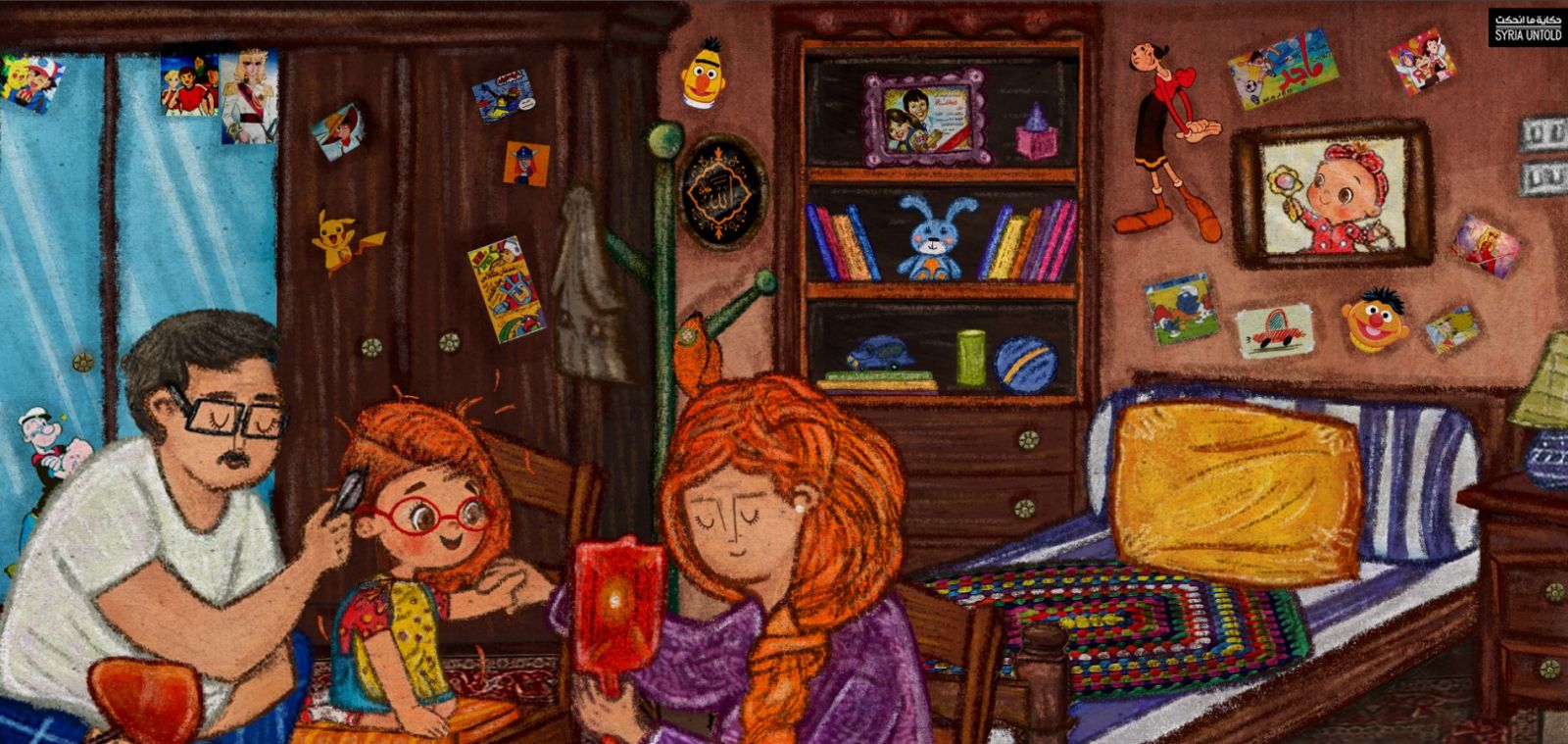Part I: Did this story really take place once upon a time?
There are so many demands for us to be accepted—unfortunately, mostly by our family members and those who populate our environments, which end up being the places where you get hurt the most in the name of love.

Illustration by Sara Khayat
This article is part of the second round of our series on LGBTIQ Syria, published and commissioned by guest editor Fadi Saleh. Read this article in Arabic here.
Read part two of this article by Sara Khayyat next week.
When did we, as children, become conscious of images? When did we internalize the visual representations that teach us how to be “proper” boys and girls who follow societal expectations? When did we start to feel that our parents’ love for us was conditional, that it was tied to how well we performed and reproduced the roles and expressions expected of the genders assigned to us at birth? How can we go back to that period and reimagine it in a way that better reflects our differences and individuality, to search for those moments when we felt safe to be ourselves, unconditionally?
In my work, especially in personal pieces, I always know that the problem starts during childhood. As adults, we do not revisit our childhood often enough. On the contrary, we fight against it, we dissociate from it and pretend it does not have an effect on our lives now. But the truth is that our childhood is our foundation. And we come from environments that are particularly unhealthy for children, especially those whose gender identities and expressions do not match societal expectations. Therefore, in my projects, I return to my memories as a child, with my family, my house, my school and my neighborhood. I feel that everyone is like me to some extent, but most people do not dare talk about these issues because they worry about their families—or they simply do not like to travel down memory lane to the places that has shaped us, our consciousness and our capacity to love ourselves the way we are. However, one thing is for sure: as children, we do not always know how to express ourselves in ways that are acceptable to adults, so we express ourselves differently. That’s why I feel that we need to work on memory and acknowledge the challenges we had as children. If we do not go back to basics, which is the home, we will never move forward.
From the minute we are born, we are assigned one of two genders: male or female. Of course, “boys” are assigned blue and “girls” pink. Soon thereafter, we are informed about what is permitted and what isn’t, and societal “acceptance” of us is based on how we look and how well we fit the boxes created for us. One of those gendering processes my friends and I always talk about is the series of “housework classes” that we (people assigned female at birth) had to take in Syria, and how they tried to form who we are from school days. In elementary school, gender roles were always divided in our reading and comprehension books. The mother is cooking, while the father is reading a magazine; the girl is helping her mother set the dinner table, but the boy is playing football. There was always this separation. Once you are done with the reading and comprehension book, you move from “reading” to “doing” during the housework and sewing classes. This gendered separation is really strange, and it does not only affect “girls” who do not feel any connection to these gender roles, but also the “boys” who might want to take on and learn more about some of these roles. Children who are gender non-conforming, who want to express their genders and feelings in an “unconventional” way that is unaccepted by society, often do not see themselves represented in the reading books or in mainstream children’s books.
And so I ask myself: did this all really happen once upon a time? And have these characters that I am drawing here ever existed or are they just fantasies of my own making? I ask other people: Did this story happen in this place and time, or am I just imagining and creating an alternative memory for you and me? To what degree can society accept it if a girl wants to have her hair cut in a “different” way?
It’s very easy to read books about self-development, self-love and acceptance, and it is very easy to tell people to love themselves. But it is very difficult to practice this form of love, especially because we come from environments that have shunned us and did not accept us the way we are. These environments constantly demand things that are beyond our capacities and that force us to be something we are not, something that does not look like us at all. There are so many demands for us to be accepted—unfortunately, mostly by our family members and those who populate our environments, which end up being the places where you get hurt the most in the name of love.
If only families really knew how much the children within us would be hurting due to their ignorance, they might have re-considered every hurtful word or condition for love they subconsciously forced on their children. No parent should accept that their children live in misery only so that society is content and “accepting."
Original Contents by Syria Untold